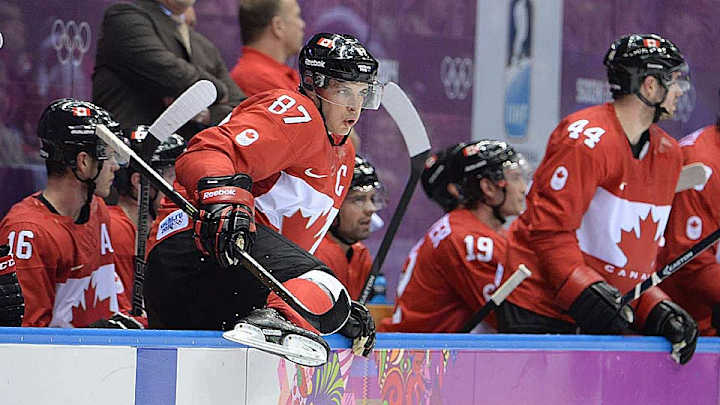Three takeways from Team Canada's quarterfinal win over Latvia

SOCHI — The Finnish win over Team Russia wasn’t really an upset, unless you’re talking about the inconsolable Olympic mascot who was hanging his oversized head in disappointment after the Russians lost Wednesday's quarterfinal game at Bolshoy Ice Dome. What came within about seven minutes of transpiring just a few hours later, when the Latvians stayed even with Team Canada at 1-1 deep into the third period, now that would’ve been an upset. But an ill-timed slashing minor by Latvian defenseman Georgijs Pujacs finally gave the Canadians the sliver of opportunity they needed. Defenseman Shea Weber broke the tie on the subsequent power play with a booming slap shot from the point that eluded goalie Kristers Gudlevskis, a starter for the Syracuse Crunch, the Tampa Bay Lightning's AHL affiliate. The 21-year-old goalie couldn’t really be blamed, though. It was the 54th of the 57 shots he faced on the night that beat him and his team.
“Facing some of the best players in the world, I thought he did a fantastic job tonight,” Latvia’s coach Ted Nolan said. Overworked in the crease, Gudlevskis was sopping by game’s end, but despite the loss, Tampa Bay's fifth-round draft pick in 2013 deserves much credit for playing the game of his life—in front of his GM Steve Yzerman, no less—and giving Latvia an outside shot at its own Miracle on Ice.
But the Canadian team was just too strong. The Latvians couldn’t win if they couldn’t even touch the puck. Canada threw their 57 shots on goal while Latvia managed only 16. It was just a matter of time before the decisive one would go in. When it did and the collective Canadian consciousness exhaled deeply, it set up a seriously juicy USA-Canada men's semifinal on Friday, a day after the two countries' women's teams battle for gold.
But before we get there, here are three takeaways from Canada’s narrow victory:
O Crosby, where art thou? The Canadian captain still hasn’t made a peep in these Olympics. And that development has predictably raised the question of his linemates and the chemistry he lacks with any of them. Against Latvia, Canada's coach, Mike Babcock, started Patrice Bergeron and Chris Kunitz with Crosby. But there is certain to be more juggling in the future. With John Tavares out for the rest of the Olympics—the center left the game in the second period with a leg injury, Babcock said—Bergeron will likely move into the open fourth line center role, once again giving Crosby a new winger to test out. But the audition process will have to be quick. They’ll need to find some combination that works to keep up with a U.S. offense that has been firing on all cylinders in Sochi.
MUIR: Canada's offense takes hit with Tavares out for rest of Games
Latvia, long known for its excellent fans, finally had something to cheer about in Sochi. The Baltic nation of 2 million people has some 1,200 registered hockey players. Nolan said there are more rinks in his hometown of Sault Ste. Marie, Ont., than there are in all of Latvia. But none of that mattered in this game or in this tournament. Making the quarterfinals for the first time ever, Latvia showed how far well structured and opportunistic play can take a team. When they weren’t laying themselves out in front of Shea Weber shots and forcing the puck to the outside, Latvia’s players were looking for shots. Their best came late in the first period, while they were down 1-0 to the Canadians, when Arturs Kulda sprung Lauris Darzins at the far blue line for a breakaway. The winger faked a slap shot, then made a nice backhanded move top shelf on Canada’s goalie Carey Price for the equalizer.
No goals, no problem? But seriously, there will definitely be a problem for Team Canada if it cannot fix its stagnant attack. Through four games, defensemen Drew Doughty and Weber have more goals (7) than all of Canada's forwards combined (6). After the game, Babcock examined his game summary with the eye of an IRS auditor. He’s looking for something that might help jumpstart this offense. He can remember that it took four games in Vancouver before the full potential of his scorers started to show. So he will work patiently. But he and Team Canada don’t have a lot of time. On Friday, they’ll face what has been the hottest team in Sochi, in a rematch of the gold medal game four years ago. “That team seems to score easy,” he said. “And we’re not scoring ... [Thursday’s practice] is a big day for us.”
ROSENBERG: Russia's loss proves the gold is won on ice, not paper
